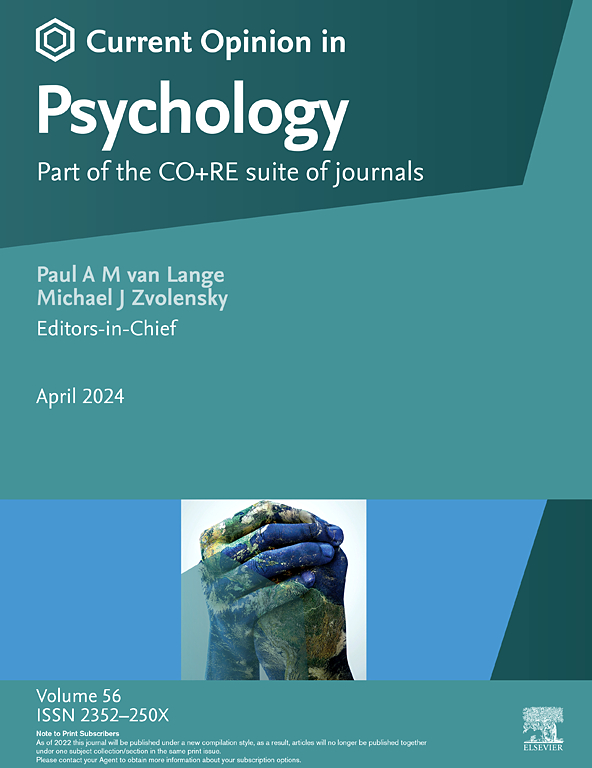Community connectedness and sustainable eating
IF 6.3
2区 心理学
Q1 PSYCHOLOGY, MULTIDISCIPLINARY
引用次数: 0
Abstract
Climate change and resource depletion threaten both humanity and ecosystems. Reduction in meat consumption is a key sustainable action, and identifying its determinants can play a crucial role in shaping effective climate change strategies. This review explores how community connectedness can influence sustainable eating and identifies potential factors shaping this relationship. Research on sustainable eating mainly examines individual factors. However, meat consumption is deeply rooted in social and cultural contexts, making change difficult. Community connectedness may both promote and hinder sustainable eating by reinforcing local dietary traditions. Although community connectedness may encourage protection of local environments and pro-environmental behaviors such as local food consumption, it may also reinforce meat-heavy culinary traditions. Since meat consumption is embedded in cultural and historical traditions globally, a strong connection to one’s community may hinder the adoption of more environmentally friendly diets – particularly when these traditions emphasize resource-heavy foods like meat. However, collective community efforts can promote sustainable diets: research indicates that strong community ties can support initiatives promoting plant-based diets with minimal animal products. Initiatives like community-based pledges, cooking courses, and community-supported agriculture can encourage plant-based diets, and foster long-term habits through education, socialization, and community-driven support. Empirical evidence also shows that the potential for community connectedness to promote sustainable eating might depend on intervening factors like environmental awareness and a broader sense of connection to nature. Future research should further explore how local and global connectedness shape sustainable eating and evaluate the effectiveness of community-based interventions aimed at promoting pro-environmental diets, to develop culturally appropriate strategies for sustainable eating.
社区联系和可持续饮食
气候变化和资源枯竭威胁着人类和生态系统。减少肉类消费是一项关键的可持续行动,确定其决定因素可以在制定有效的气候变化战略方面发挥关键作用。本综述探讨了社区联系如何影响可持续饮食,并确定了形成这种关系的潜在因素。对可持续饮食的研究主要考察个人因素。然而,肉类消费深深植根于社会和文化背景,这使得改变变得困难。社区联系可能通过加强当地饮食传统来促进和阻碍可持续饮食。虽然社区联系可能鼓励对当地环境的保护和亲环境行为,如当地食品消费,但它也可能加强以肉类为主的烹饪传统。由于肉类消费是全球文化和历史传统的一部分,因此与社区的紧密联系可能会阻碍人们采用更环保的饮食——特别是当这些传统强调肉类等资源密集型食物时。然而,社区的集体努力可以促进可持续饮食:研究表明,牢固的社区关系可以支持促进以最少动物产品为基础的植物性饮食的倡议。社区承诺、烹饪课程和社区支持农业等举措可以鼓励植物性饮食,并通过教育、社会化和社区驱动的支持培养长期习惯。经验证据还表明,社区联系促进可持续饮食的潜力可能取决于环境意识和更广泛的自然联系感等干预因素。未来的研究应进一步探索本地和全球联系如何塑造可持续饮食,并评估旨在促进亲环境饮食的社区干预措施的有效性,以制定适合文化的可持续饮食策略。
本文章由计算机程序翻译,如有差异,请以英文原文为准。
求助全文
约1分钟内获得全文
求助全文
来源期刊

Current Opinion in Psychology
PSYCHOLOGY, MULTIDISCIPLINARY-
CiteScore
12.10
自引率
3.40%
发文量
293
审稿时长
53 days
期刊介绍:
Current Opinion in Psychology is part of the Current Opinion and Research (CO+RE) suite of journals and is a companion to the primary research, open access journal, Current Research in Ecological and Social Psychology. CO+RE journals leverage the Current Opinion legacy of editorial excellence, high-impact, and global reach to ensure they are a widely-read resource that is integral to scientists' workflows.
Current Opinion in Psychology is divided into themed sections, some of which may be reviewed on an annual basis if appropriate. The amount of space devoted to each section is related to its importance. The topics covered will include:
* Biological psychology
* Clinical psychology
* Cognitive psychology
* Community psychology
* Comparative psychology
* Developmental psychology
* Educational psychology
* Environmental psychology
* Evolutionary psychology
* Health psychology
* Neuropsychology
* Personality psychology
* Social psychology
 求助内容:
求助内容: 应助结果提醒方式:
应助结果提醒方式:


